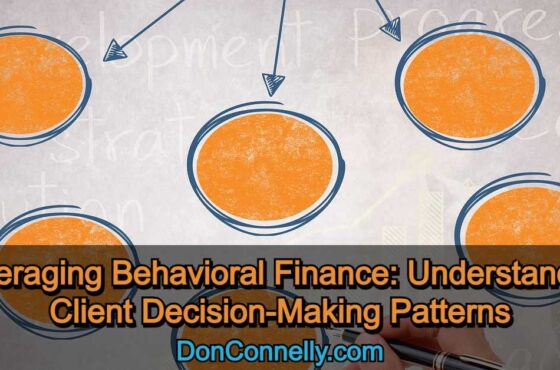How to Raise Conversations Your Clients Don’t Know They Should Have
 Most clients hire a financial advisor because they expect him or her to know more than they do about planning their future. They willingly pay you to leverage your expertise to educate them and guide their financial decisions based on your understanding of their circumstances, goals, and concerns. They expect you to help them navigate obstacles that pop up unexpectedly.
Most clients hire a financial advisor because they expect him or her to know more than they do about planning their future. They willingly pay you to leverage your expertise to educate them and guide their financial decisions based on your understanding of their circumstances, goals, and concerns. They expect you to help them navigate obstacles that pop up unexpectedly.
Most clients don’t know what they don’t know, which is their greatest vulnerability. That means they don’t know enough to ask their financial advisor about things that could potentially impact them. If they’re left in the dark about such things, the financial advisor takes the blame when bad things happen. What is their defense when a client asks, “Why didn’t you tell me about that?”
An Advisor’s job is to know what their clients need to know—and let them know
Most advisors can uncover needs and goals and design a plan with custom solutions. That might include uncomfortable discussions about death, divorce, job loss, and special needs. That’s expected, and many clients will be okay with that. However, to show your true worth as a trusted advisor, you must lead your clients to places they don’t expect or are uncomfortable going. If you don’t bring up certain critical conversations, no one will.
For example, a client with adult children claims they do not need a living trust because all their assets are willed to their children, whom they trust to make sound financial decisions. Who will be the one to ask them if they trust their children’s spouses? Who will point out that nearly half the marriages in the U.S. end in divorce? Who will point out that, when planning for their children’s future, they need to prepare for the unexpected?
It could be an uncomfortable conversation, but they need to be concerned about protecting their children’s wealth. By recommending a living trust with provisions to protect their children’s wealth, you demonstrate you are working in their best interests by addressing a potential problem they didn’t know they had.
Another difficult subject for clients and advisors is what to do about potential long-term care needs. Clients often brush the issue off because a) they don’t think it will ever happen to them, b) they feel they have sufficient assets to cover the need or c) they feel their family members will step in as caregivers if needed.
If they don’t buy the statistics that show a 70% chance of needing long-term care after age 65, and they may indeed have sufficient assets to cover their care needs, you can turn the conversation to their children and their relationships with them. Who else will ask, “You may never need long-term care. But if you did, have you thought about how the consequences of providing your care could impact your children’s lives?” You could follow that up with something like, “Do you want your family to care for you or about you?” Again, it will be uncomfortable, but that’s the point.
How to raise a difficult issue
There are countless topics that can lead to a difficult dialogue. As an advisor, your job is to know what your clients need to know, whether they ask you or not. The challenge is how to raise sensitive subjects if they don’t come up naturally in conversations. In many cases, you will be catching your clients off guard, which could create backlash if it’s not handled properly. The safest way to broach a difficult subject is to ask permission. When you ask permission, you demonstrate respect for your client’s autonomy while clearing the way for explaining why the conversation is important. You might say something like:
“I’ve been thinking about something pertaining to your situation that you haven’t brought up but would be important to discuss. Can I ask you about it?”
Once your client gives permission to proceed, present the issue in a straightforward manner with empathy. Give your client an opportunity to respond and ask questions. If you sense resistance, gently probe the issue with additional, thought-provoking questions. The goal is to move your client to think about the issue in ways they’ve never done. With the right questions, you may be able to move your client to come to the same conclusion you were presenting.
If your client is still resistant, allow them to back down gracefully while suggesting that the issue is important and that they should think about it. If nothing else, you’ve done your job in alerting your client to a potential problem and shifted the responsibility to them. Don’t be surprised if they raise the subject on their own in the future.
Watch this 3-minute video to learn how our 24-step training program will help you improve your communication skills and become brilliant at the basics.
(Becoming a client advocate, caring more than people expect you to care, communicating as intended – these are only a few of the modules covered in this program.)
See program details and enroll today!
Available as a self-paced program (always open) or as a 12-week coaching program (open only a few times a year), this training will change the way you view your practice and give you an enormous advantage over your competition. Select your format and join today!



